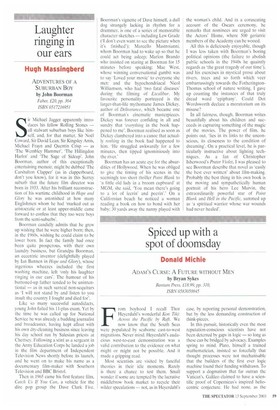Laughter ringing in our ears
Hugh Massingberd
ADVENTURES OF A SUBURBAN Boy by John Boorman Faber, £20, pp. 304 ISBN 0517216951 Sir Michael Jagger apparently introduces his fellow Rolling Stones — all stalwart suburban boys like himself, and, for that matter, Sir Noel Coward, Sir David Lean, Sir Kingsley Amis, Michael Frayn and Quentin Crisp — as 'The Wembley Hammer', 'The Hillingdon Harlot' and The Sage of Sidcup'. John Boorman, author of this exceptionally entertaining memoir, might be dubbed The Carshalton Clapper' (as in clapperboard, don't you know), for it was in this Surrey suburb that the future film director was born in 1933. After his brilliant reconstruction of his wartime childhood in Hope and Glory he was astonished at how many Englishmen whom he had 'marked out as aristocratic or at least upper-middle came forward to confess that they too were boys from the semi-suburbs'.
Boorman candidly admits that he grew up wishing that he were higher born; then, in the 1960s, wishing he could claim to be lower born. In fact the family had once been quite prosperous, with their own laundry business, but Grandpa Boorman, an eccentric inventor (delightfully played by Ian Bannen in Hope and Glory), whose ingenious wheezes included the first washing machine, left 'only his laughter ringing in our ears'. The humour of his buttoned-up father tended to be unintentional — as in such surreal non-sequiturs as 'I will not stand by and listen to you insult the country I fought and died for'.
Like so many successful autodidacts, young John failed his 11-plus exam. Yet by the time he was called up for National Service he was already a budding journalist and broadcaster, having kept afloat with his own dry-cleaning business since leaving his day school run by Salesian priests at Chertsey. Following a stint as a sergeant in the Army Education Corps he landed a job in the film department of Independent Television News shortly before its launch, and he went on to make his name as a documentary film-maker with Southern Television and BBC Bristol.
Then in 1965 came his first feature film, Catch Us If You Can, a vehicle for the dire pop group the Dave Clark Five.
Boorman's vignette of Dave himself, a dull dog strangely lacking in rhythm for a drummer, is one of a series of memorable character sketches — including Lew Grade ('I don't even want to see the picture when it's finished); Marcello Mastroianni, whom Boorman had to wake up so that he could act being asleep; Marlon Brand° who insisted on staring at Boorman for 15 minutes before speaking; Mae West, v'hose winning conversational gambit was to say 'Loved your movie' to everyone she met: and the hypochondriacal Nicol Williamson, who had 'two fatal diseases' during the filming of Excalibur. My favourite personality portrayed is the larger-than-life mythomane James Dickey, author of Deliverance, which became one of Boorman's cinematic masterpieces. Dickey was forever confiding in all and sundry that 'everything in the book happened to me'. Boorman realised as soon as Dickey clambered into a canoe that actually nothing in the book had happened to him. 'He struggled awkwardly for a few minutes, then tipped ignominiously into the river.'
Boorman has an acute eye for the absurdities of Hollywood. When he was obliged to give the timing of his scenes in the seemingly too short thriller Point Blank to 'a little old lady in a broom cupboard' at MGM, she said, 'You mean there's going to a lot of leerin and peerin'.' On a Californian beach he noticed a woman reading a book on how to bond with her baby; 30 yards away the nanny played with the woman's child. And in a coruscating account of the Oscars ceremony, he remarks that nominees are urged to visit the Actors' Home, where 500 geriatric members of the Academy can be wooed.
All this is deliciously enjoyable, though I was less taken with Boorman's boring political opinions (the failure to abolish public schools in the 1940s he quaintly regards as 'the great tragedy of our time.), and his exercises in mystical prose about rivers, trees and so forth which veer embarrassingly towards the FotheringtonThomas school of nature writing. I gave up counting the instances of that truly dread word 'epiphany'. Could Dot Wordsworth declare a moratorium on its misuse?
In all fairness, though, Boorman writes beautifully about his children and succeeds in capturing something of the magic of the movies, The power of film, he points out, 'lies in its links to the unconscious, its closeness to the condition of dreaming'. On a practical level, he is particularly instructive about lighting techniques. As a fan of Christopher Isherwood's Prater Violet, I was pleased to see Boorman describe that novel as 'easily the best ever written' about film-making. Probably the best thing in his own book is the moving and sympathetically human portrait of his hero Lee Marvin, the extraordinarily powerful star of Point Blank and Hell in the Pacific, summed up as 'a spiritual warrior whose war wounds had never healed'.


























































































 Previous page
Previous page